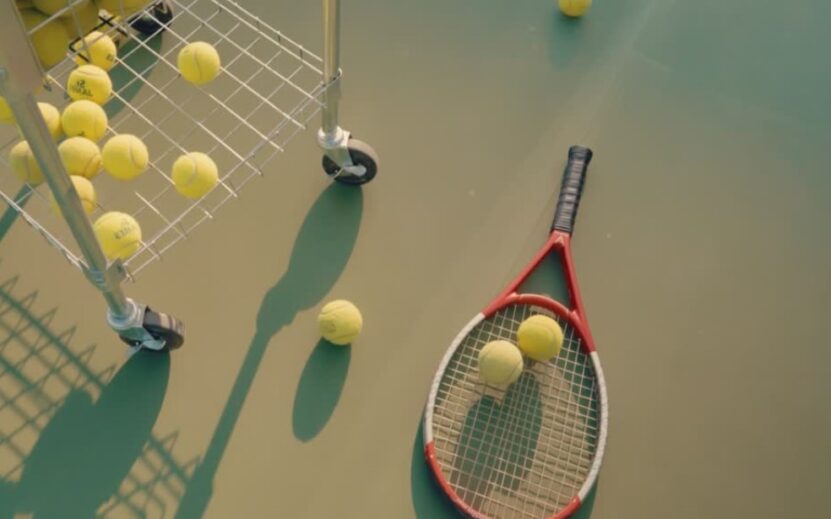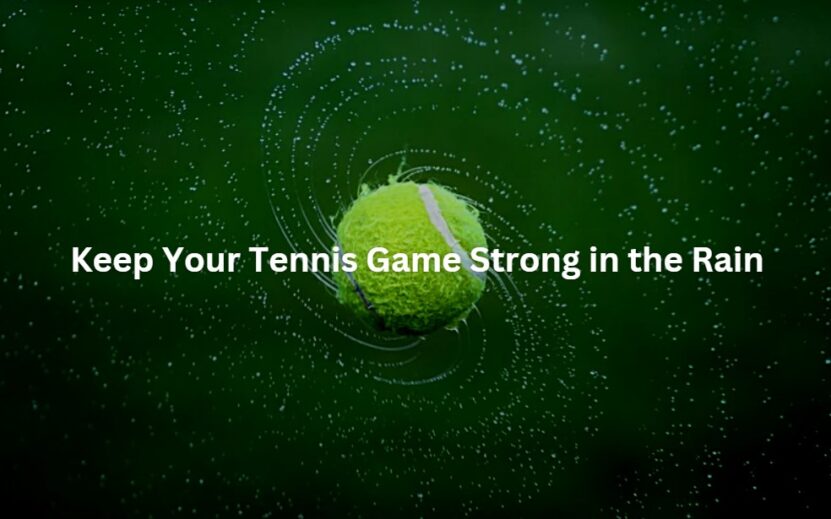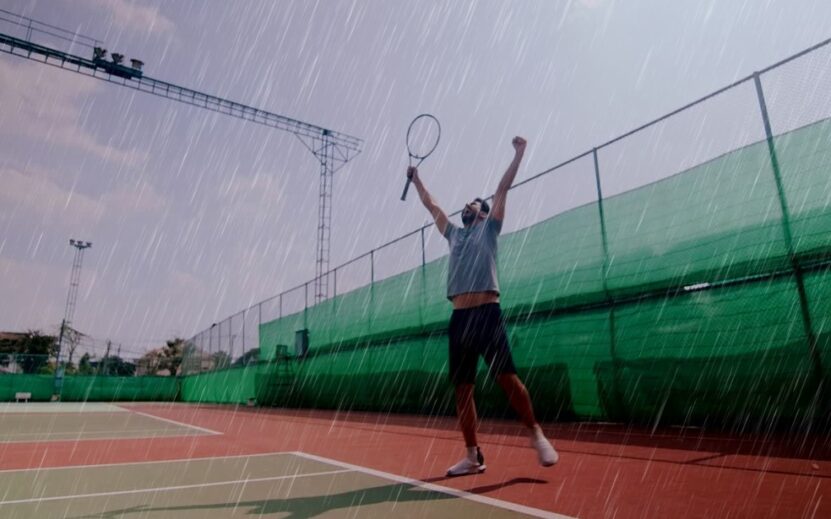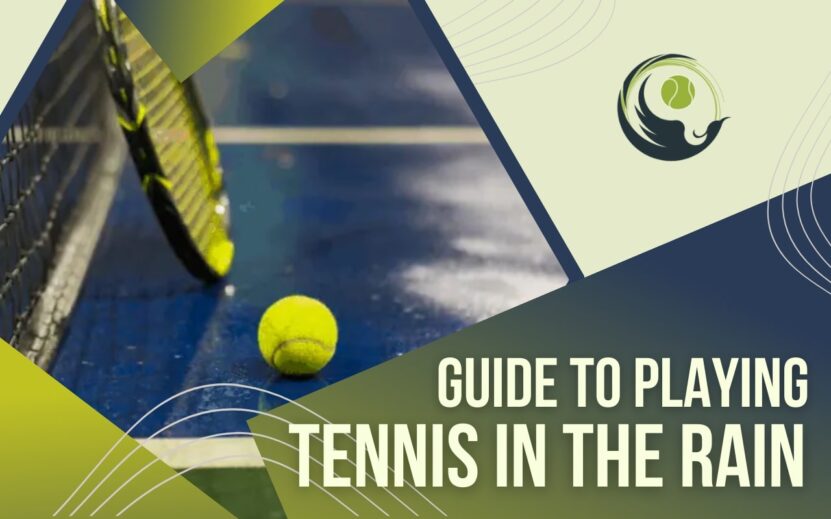If you are a tennis enthusiast, you know that playing in the rain is not a foreign concept. Tennis players, like most athletes, are used to practicing in all sorts of weather conditions. However, there are some risks involved when playing tennis in such conditions, and it is important to be aware of these risks before hitting the court. In this blog post, we will take a closer look at whether it is safe to play tennis in the rain and how to do it safely.
Assess the Weather Conditions
Before you even consider playing tennis in the rain, you need to assess the weather conditions. If there is lightning, high winds, or heavy rain, it is best to stay off the court.
Lightning can be extremely dangerous and poses a significant risk to players on the court. High winds can also affect gameplay and increase the risk of injury. Heavy rain can make the court slippery and increase the risk of slipping and falling.
If you do decide to play in the rain, make sure to keep an eye on the weather conditions and be prepared to stop playing if conditions worsen.
Choose the Right Gear

When playing tennis in unfavorable conditions, it is essential to choose the right gear. A rain jacket or waterproof coat can help keep you dry during play. Waterproof shoes with good traction can help prevent slipping and falling on the wet court. Additionally, wearing a hat with a brim can help keep the rain out of your eyes and improve visibility.
It is also a good idea to bring a towel to dry off any excess moisture on the court before playing. If the court is too wet, it may be necessary to postpone your game until the rain stops or the court dries out.
Adjust Your Technique
Playing tennis in the rain can be challenging because the ball and court can become slippery. Therefore, it is essential to adjust your technique to compensate for these conditions.
One way to do so is to take shorter steps and keep your feet closer to the ground when running. This can help improve your balance and prevent slipping.
It is also important to hit the ball with more topspin to prevent it from sliding off the racket. Additionally, hitting the ball with a flatter trajectory can help keep it from bouncing too high on the wet court.
Be Prepared for Wet Tennis Balls

It does not come as a surprise that playing in these conditions will make the ball wet. Wet tennis balls can become heavy and affect the bounce and trajectory of the ball. Therefore, it is important to be prepared for it.
One way to do so is to bring a few extra balls and rotate them out as they become too wet to play with. Additionally, wiping the ball off with a towel before each serve can help improve grip and reduce the risk of slipping.
Stay Hydrated
When playing tennis in the rain, it is easy to forget about hydration because you are already wet. However, staying hydrated is essential to prevent dehydration and heat exhaustion. Therefore, it is important to bring plenty of water and sports drinks.
Do Professional Tennis Players Play Matches in Rain?

While recreational players can often postpone their games, professional players do not have the luxury of rescheduling matches due to weather conditions. So, do professional tennis players play matches in the rain? The answer is – it depends.
1. Rules and Regulations
The rules and regulations of professional tennis allow for matches to be played in the rain as long as the court is still playable. However, if the conditions are deemed unsafe or if there is a risk of injury to players, the match will be postponed or canceled.
2. Rain Delays
If rain occurs during a match, players will typically take a short break until the rain subsides or the court can be covered. This is known as a rain delay. During this process, players will often retreat to the locker room or other covered areas to stay dry and warm.
After the rain has stopped and the court has been dried off, players will resume the match. If the rain delay is prolonged, players may be allowed to warm up again before continuing the match.
3. Wet Conditions
Playing in wet conditions can be challenging for professional tennis players. The ball and court can become slippery, which can affect gameplay and increase the risk of injury. Therefore, players will often adjust their technique to compensate for the wet conditions.
Players may take shorter steps and keep their feet closer to the ground when running to improve their balance and prevent slipping. They may also hit the ball with more topspin to prevent it from sliding off the racket and hit the ball with a flatter trajectory to keep it from bouncing too high on the wet court.
4. Safety First
While professional tennis players are expected to play in wet conditions, safety is always the top priority. If the conditions become too unsafe, the match will be postponed or canceled. Additionally, players will often consult with trainers and officials to ensure that they are not putting themselves at risk of injury.
Frequently Asked Questions
1. Is it safe to play tennis in the rain?
Playing tennis in the rain can be safe as long as the conditions are not too dangerous. Lightning, high winds, and heavy rain can pose a significant risk to players on the court. Therefore, it is important to assess the weather conditions and be prepared to stop playing if conditions worsen.
2. How do I prepare for playing tennis in the rain?
To prepare for these conditions, you should choose the right gear, adjust your technique, and be prepared for wet tennis balls. This includes wearing a rain jacket, waterproof shoes, and a hat with a brim. It also includes hitting the ball with more topspin and taking shorter steps to improve your balance. Finally, you should bring extra tennis balls and towels to help dry off the court and the balls.
3. Can professional tennis players play matches in the rain?
Yes, as long as the court is still playable and conditions are not too dangerous. Rain delays are common during professional tennis matches, and players will adjust their technique to compensate for the wet conditions.
4. What are the risks of playing tennis in the rain?
The main risks of playing tennis in the rain include slipping and falling on the wet court, the ball becoming heavy and affecting gameplay and the increased risk of injury due to slippery conditions. Additionally, lightning and high winds can pose a significant risk to players on the court.
Final Words
In conclusion, playing tennis in the rain can be safe as long as you assess the weather conditions, choose the right gear, adjust your technique, prepare for wet tennis balls, and stay hydrated.
However, it is important to remember that playing in the rain can be challenging and increase the risk of injury. Therefore, it is always a good idea to exercise caution and stay aware of changing weather conditions.
We recently published an article about whether or not you can play tennis alone, so make sure to check it out if you want to find out more about individual practices.

